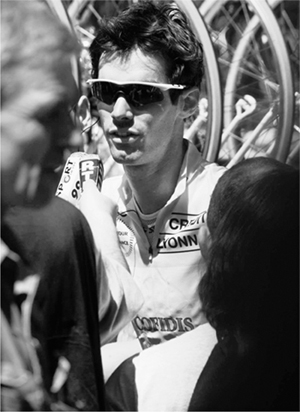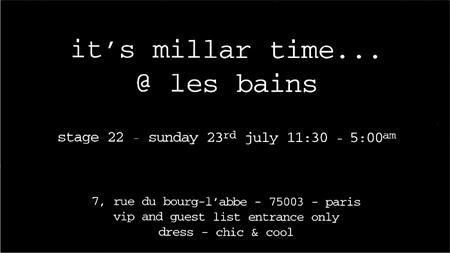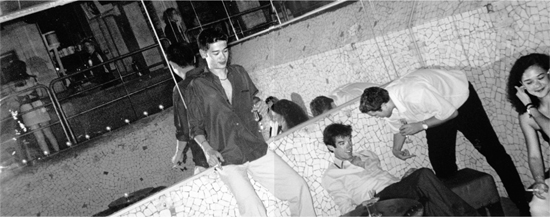When I woke up the next day, the first thing I saw was the yellow jersey hanging over a chair in my hotel room. I couldn’t wait to start racing in it, to be the maillot jaune at the Tour de France.
I was told to wait in the bus until as late as possible before signing on at the start village, but of course I couldn’t do that. I wasn’t really prepared for the chaos that surrounded me when I finally did emerge.
I was mobbed. Everybody was calling out, “DAVEED! DAVEED!” shaking my hand, taking a picture, or stopping me for a chat and an autograph. I tried to satisfy as many demands as I could, although I realized that just wasn’t possible or I’d never make it to the start line. In the space of twenty-four hours everything had changed; I was no longer a young espoir, I was now le maillot jaune.
Out on the road, racing with my peers, I was able to appreciate the value of the yellow jersey. Almost all the big hitters came and congratulated me. Their words were heartfelt, and they seemed genuinely pleased for me. Lance spent a little time joshing with me but was genuinely happy that I’d won, which made me proud.
The notable exception was Marco Pantani, winner of the Tour in 1998. Not once did he congratulate me, which I found a bit strange. It was almost obligatory for a past Tour champion to congratulate the young pretender. It didn’t change my view of him as a rider, but his cold attitude did separate him from the others.
Riding in yellow totally changed my experience of moving through the peloton—a living organism, in constant flux—a breathing, kinetic, noisy, colorful being. In order to hold your position, particularly in the front half, you must be constantly moving up. The moment you relax you’ll find yourself losing position, simply because when there are two hundred elite cyclists racing along a road, the majority want to be at the front. If you’re not at the front, you’re not in the race.

July 2000, Tour de France. Center of attention.
The more important the race is, the more nervous the riders are, and the more time they want to spend at the front. This puts the peloton in an aggressive mood, which means mistakes are made and crashes caused. If you’re at the back of the Tour peloton, there are two hundred chances of crashes in front of you; the closer you are to the front, with an empty road ahead of you, the less chance there is of crashing because there are fewer riders in front of you and so less chance of being brought down.
I had been told that the Tour peloton was one of the most stressful in cycling, a bastard to hold position in, very fast and dangerous. So I was prepared for the worst. But I hadn’t realized how different it would be when I was wearing the leader’s jersey. Normally, there is no chance of somebody letting you into a gap in order to move up the peloton, but in the maillot jaune this is not the case. I found myself being let into every single gap and riders happily moved out of the way for me. Wearing the yellow jersey gave me an access-all-areas VIP pass, a laissez-passer through the peloton. And this wasn’t about my being respected—it was the maillot jaune that was respected. I wasn’t wearing the yellow jersey; the yellow jersey was gracing me.
I was in yellow for three days. There was one near miss when I crashed in the final couple of kilometers of the stage coming into Nantes, but I was up so fast that I was back in the safety of the peloton in no time. I finally lost the lead in the 70-kilometer team time trial on the third day. We were never renowned as a team time trial squad, but our performance was better than normal, and we defended the jersey with pride.
Those three days had made me the darling boy of France—one local paper christening me Le Dandy—and the public had warmed to the young Scot leading the big French team and wearing the yellow jersey. It helped that by this time I spoke French and also lived in France. The French like nothing more than a foreigner who has chosen their great république as their home, and being Scottish helped as well, as the auld alliance lived strong in French memories. I learned that much during the Tour.
“Vous êtes Ecosse?! Ah oui! ça, c’est complétement different! Bof, on aime pas trop les Anglais non plus!” You’re Scottish?! Ah, yes. That’s completely different. [The French] We’re not too keen on the English either!
The race continued, moving inexorably toward an Armstrong victory. One day, awhile after the yellow jersey had moved on to another rider, I was sitting at the back chatting to Stuart O’Grady and a couple of the other boys. The U.S. Postal team was coming up the right side of the peloton, bringing Lance back up through the riders. As Lance came by he looked at me and called to his team to wait.
I turned to Stuey: “Here we go,” I said.
“Dave! Come here!” Lance gestured for me to move across to him so he could speak to me.
I pedaled over to his side. “What’s going on, Lance?” I asked innocently.
“Dave, what are you doing back here?” he asked. I may not have been on the same team as Lance, but I think he still considered me to be his little protégé in some ways.
“Chatting to the boys, just a bit of a calm moment,” I said.
“Dave, this is the Tour de France,” he said sternly.
“I know, Lance, I know.”
“Well, Dave, at the Tour de France you have no friends. Ride at the front.” It wasn’t a suggestion. It was an instruction.
“Yeah—er, okay, Lance.” I looked back at Stuey and shrugged. “See you later.”
It was a classic Armstrong moment, capturing both how expert he had become at always being at the front and exactly how he saw the Tour de France. It was war for him.
I wanted to finish my debut Tour, but I had no intention of just taking it easy in order to get to Paris. I wanted to go as hard as I could, for as long as I could. In the first mountain stages, in the Pyrenees, I buried myself and realized just how much better I needed to be if I wanted to stand any chance of racing for the overall standings at the Tour. It was a rude awakening, although a couple of days later I was fourth on a stage finishing near Toulouse, which lifted my morale again.
By the time we got to Mont Ventoux I knew a lot more about Tommy Simpson and had a feeling there would be a lot of British fans on the mountain. I wanted to do my best, but I crashed early in the stage, coming down on a spinning back wheel, with my neck taking the full impact. It hurt like hell, left a big gash on my neck, and popped my collarbone. I groveled up the Ventoux and was embarrassed to be right at the back of the race. So many people knew my name now and were cheering for me, something I’d never experienced before. I wanted to tell every fan that I’d crashed and was in pain and that’s why I wasn’t nearer the front.
The final week included three stages of around 250 kilometers, and the first of these was a mountain stage to Briançon. It was a mammoth day, and we ended up racing for over eight hours. The route was nonsensical and went against all the talk of changing cycling and of eradicating doping. I was fuming at the race organizers and didn’t hide my feelings, especially when we got stuck in a traffic jam on the way to the hotel.
“It was bullshit,” I told journalists. “They want to clean up cycling, and then after two weeks of racing they put on a stage like that. They must think we’re robots. Jean-Marie Leblanc needs a slap.”
Most riders—let alone Tour rookies—might have thought twice before suggesting that the Tour director “needed a slap” … not me.
But Jean-Marie and I made up the next day; I regretted my outspokenness while he was very honorable and apologized for the length of the stage. I was beginning to realize that people—or at least the media—listened when I talked. Unfortunately, I hadn’t yet realized that this meant I had to think before I spoke.

The invitation to the Tour de France closing party my sister organized.
My sister France had been amazingly supportive prior to the Tour, and she became even more so after I won on the first day. She had become the go-to person when it came to “David Millar,” taking care of everything, but then she’d always looked after her older brother. She had become much more professional about her role now that I was in demand. We were also having fun, though, and we wanted to finizh the Tour with a bang, so we—well, she—set about organizing a party for the final night in Paris.
Fran managed to get one of the most famous nightclubs in Paris, Les Bains Douches, to open especially for us on the Sunday evening after the finish on the Champs-Élysées. She had invitations printed up with “It’s Millar Time—Stage 22” emblazoned on them. I intended to hand them out to everybody on the Champs-Élysées stage. I even got Jean-Marie Leblanc to take a handful so that he could give them to the podium girls; there was one in particular whom I had a crush on, although unfortunately, it was unrequited. Fran was only twenty-one and I was twenty-three—yet we were planning on ruling Paris for a night. Rather than being daunted by the Tour, we already felt it was part of our lives.
I was tired during the last week, but such was the excitement about making it to Paris that I couldn’t sleep. I was like a six-year-old kid, waiting for Christmas. All my family and friends were coming to the finish, my best friends from Hong Kong had come over, my mum and dad were both going to be there, albeit on opposite sides of the road, and lots of others had also made the trip. It was brilliant having my family and friends there to share it.
Yet I wasn’t prepared for my feelings when I arrived on the Champs-Élysées. Being part of the Tour peloton and racing up toward the Arc de Triomphe was an overwhelming moment. Every rider who makes it to the Champs-Élysées has had a different experience getting there, but I think we all feel the same when we hit those cobblestones and take in the magnificence of that setting.
I knew where my family and friends would be standing on the Champs-Élysées, and I told them I would get into the standard breakaway so they could see me. Somehow, I did manage to get into the obligatory kamikaze attack, and every time I passed the “It’s Millar Time” group I clenched a fist to my heart and saluted them. It was a bit cocky, I suppose, but I didn’t know any better, and it was all done in celebration.
I really didn’t want it to finish. The team organized cocktails in the penthouse bar of the Concorde Lafayette, and by the time I got there I was already a bit drunk. Harry gave me a beautiful yellow-faced watch and a bottle of whiskey that, a decade later, I still have.

July 2000, Paris post-Tour party. Surrounded by my friends from Hong Kong: Ruggero, Euan, and Rachele.
We had dinner in the restaurant of Les Bains Douches. Harry and I were last out of the club, immersed in deep, drunken thoughts while the cleaners brushed up around us. We stumbled out into the dawn light of a beautiful Parisian morning. I think I slept for about three hours before heading to a lunch rendezvous at the Trocadéro.
Lunch was even better than the night before, but it had to end some time, and, sadly, Monday drew to a close and everybody returned to their lives and jobs. I wasn’t looking forward to the journey back to my flat in Biarritz. The bubble that I’d been living in for a month had burst, and I was on my own again.
Arriving back at the apartment was a big comedown. I dragged in my bike bag and suitcase and dumped them in the small entrance hall. In the kitchen an empty bowl, with the remnants of the cereal I’d wolfed down in my last-minute rush out of the door a month earlier, lay in the sink.
I went through to the living room, turned on the TV, and collapsed on the sofa. I sat there blankly, watching French television. Everything had changed, yet nothing had changed. It was a rude awakening. I’d just made my boyhood dream a reality, yet I felt lonelier than ever.